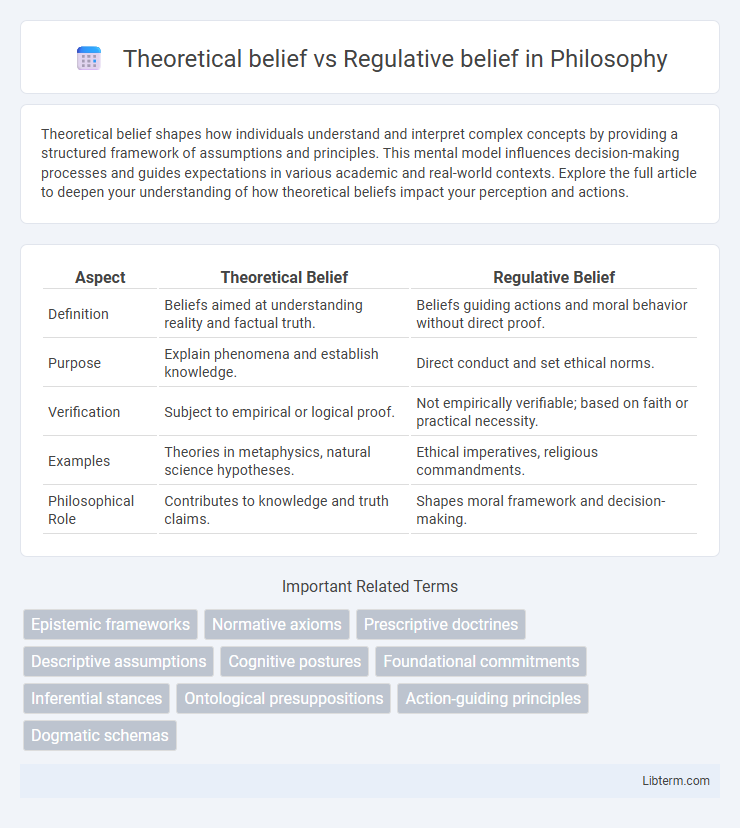Theoretical belief shapes how individuals understand and interpret complex concepts by providing a structured framework of assumptions and principles. This mental model influences decision-making processes and guides expectations in various academic and real-world contexts. Explore the full article to deepen your understanding of how theoretical beliefs impact your perception and actions.
Table of Comparison
| Aspect | Theoretical Belief | Regulative Belief |
|---|---|---|
| Definition | Beliefs aimed at understanding reality and factual truth. | Beliefs guiding actions and moral behavior without direct proof. |
| Purpose | Explain phenomena and establish knowledge. | Direct conduct and set ethical norms. |
| Verification | Subject to empirical or logical proof. | Not empirically verifiable; based on faith or practical necessity. |
| Examples | Theories in metaphysics, natural science hypotheses. | Ethical imperatives, religious commandments. |
| Philosophical Role | Contributes to knowledge and truth claims. | Shapes moral framework and decision-making. |
Understanding Theoretical Belief: Definition and Scope
Theoretical belief refers to convictions grounded in abstract reasoning and empirical evidence, forming the basis for knowledge claims within philosophy and science. It encompasses propositions accepted as true based on logical consistency and factual verification, rather than practical application. Understanding theoretical belief involves examining its role in shaping epistemological frameworks and distinguishing it from regulative beliefs that guide behavior and decision-making.
Regulative Belief Explained: Shaping Actions and Behavior
Regulative belief refers to the principles or norms that guide individuals' actions and behaviors in daily life, shaping decision-making processes and social interactions. Unlike theoretical beliefs, which concern understanding and knowledge about reality, regulative beliefs influence how people ought to act to align with cultural or moral standards. These beliefs play a crucial role in maintaining social order by directing conduct according to accepted values and expectations.
Key Differences Between Theoretical and Regulative Beliefs
Theoretical beliefs focus on understanding reality and truth, emphasizing intellectual comprehension and factual accuracy, whereas regulative beliefs guide behavior and decision-making, shaping moral values and practical actions. Theoretical beliefs are validated through evidence and logical consistency, while regulative beliefs are evaluated based on their effectiveness in regulating conduct and promoting social coherence. Key differences lie in their purpose: theoretical beliefs explain the world, and regulative beliefs prescribe how individuals should act within it.
Origins and Development of Theoretical Beliefs
Theoretical beliefs originate from cognitive processes aimed at understanding and explaining phenomena, evolving through observation, reasoning, and evidence evaluation. Their development is rooted in intellectual inquiry and scientific exploration, where conceptual frameworks are refined to achieve coherent and consistent explanations. This contrasts with regulative beliefs, which primarily guide behavior and ethical conduct rather than seeking factual knowledge.
How Regulative Beliefs Influence Decision-Making
Regulative beliefs guide behavior by shaping how individuals interpret choices and prioritize actions, often operating beneath conscious awareness to influence decision-making processes. These beliefs regulate practical conduct by establishing norms and expectations, which determine responses to various situations and impact judgment accuracy. By directing focus toward values and goals, regulative beliefs help filter information, reduce cognitive load, and streamline complex decisions in dynamic environments.
The Role of Theoretical Belief in Knowledge Formation
Theoretical beliefs serve as foundational frameworks that guide the interpretation and integration of new information, playing a crucial role in knowledge formation by enabling individuals to construct coherent worldviews. These beliefs shape hypotheses, influence evidence evaluation, and drive the pursuit of justification in epistemic processes. Unlike regulative beliefs that govern behavior, theoretical beliefs directly impact cognitive comprehension and the expansion of epistemic understanding.
Effects of Regulative Belief on Social Norms
Regulative beliefs shape social norms by influencing individuals' behavioral expectations and prescribing acceptable conduct within a community. These beliefs guide routine actions and enforce conformity, often strengthening social cohesion and stabilizing group dynamics. The impact of regulative beliefs extends to reinforcing collective values and maintaining order through perceived obligations and sanctions.
Interactions Between Theoretical and Regulative Beliefs
Interactions between theoretical beliefs, which concern factual understanding and truth claims, and regulative beliefs, which guide behavior and ethics, shape how individuals harmonize knowledge with action. Theoretical beliefs influence the formation of regulative principles by providing a foundation of what is considered true or valid, while regulative beliefs can modify theoretical views through practical experiences and moral considerations. This dynamic interplay is essential in domains such as religion, science, and philosophy, where belief systems continuously evolve through reciprocal adjustments between cognition and practice.
Practical Implications: When Beliefs Guide Practice
Theoretical beliefs provide a cognitive framework based on abstract understanding, influencing decision-making by shaping how information is interpreted and valued in practice. Regulative beliefs directly guide actions and behaviors through normative principles, often serving as behavioral standards in various contexts such as ethics, law, and personal habits. Understanding the interplay between theoretical and regulative beliefs enhances practical applications in leadership, education, and policy-making, ensuring decisions align with both knowledge and moral directives.
Theoretical vs. Regulative Belief: Contemporary Debates
Theoretical belief involves accepting propositions as true based on evidence or reasoning, central to scientific inquiry and epistemology, whereas regulative belief guides actions and practices without necessarily requiring empirical proof, crucial in ethics and religion. Contemporary debates focus on whether theoretical and regulative beliefs can be fully separated or if they influence each other, emphasizing the interplay between knowledge and practice in areas like moral philosophy and cognitive science. Scholars examine how regulative beliefs shape perception and decision-making, while theoretical beliefs provide frameworks for understanding reality, highlighting ongoing discussions about justification and practical rationality.
Theoretical belief Infographic

 libterm.com
libterm.com